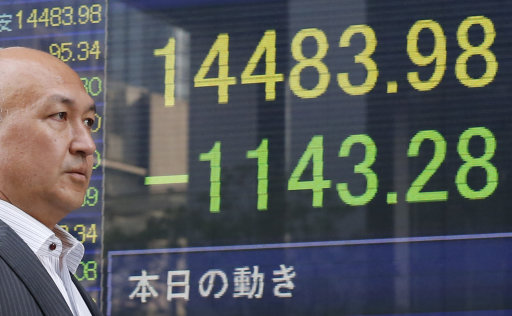After the tumult in Japan, investors jumped quickly out of riskier assets. Spanish and Italian government bonds weakened, as did more-speculative currencies like the South African rand. Havens such as German government bonds and the Swiss franc gained. Gold also rose.
The markets were jostled by a confluence of events that interrupted amonthslong rally in risky assets. Thanks in large part to a flood of easy money from global central banks, investors had gleefully bought stocks—particularly Japanese stocks—and smiled on European bonds they once shunned.
But comments Wednesday by U.S. Federal Reserve Chairman Ben Bernanke and minutes from the Fed's recent policy meeting suggested that the Fed might start pulling back on its bond purchases sometime this year. That made investors fret that the flood might soon be tapering and dovetailed withweak Chinese manufacturing data to send the Nikkei tumbling. It fell 1,143.28 points to close at 14483.98, a drop of 7.3%, the worst decline by percentage since right after the March 2011 earthquake and tsunami.
The Nikkei rose in early trading, but the impact of the Fed comments were evident in rising Japanese government-bond yields. When the Chinese data were released, stocks shifted course.
Big losers in Japan were China-related companies, such as construction-equipment maker Komatsu Ltd., 6301.TO -7.00% which fell 7%, and those, such as real-estate developers and banks, that have benefited from low bond yields. Mr. Bernanke's comments caused bond yields in the U.S. and Japan to spike. Yields on the 10-year Japanese government bond spiked to their highest level in more than a year.
The yen, meanwhile, which had weakened against the dollar during Japanese stocks' rise, strengthened sharply Thursday and was at ¥101.42 late morning in Europe, from ¥103.57 in Asian morning trading.
The yen rebound, coupled with the weak China data—the preliminary HSBC China Manufacturing Purchasing Managers' Index fell to a seven-month low of 49.6 for May—hit Japanese exporters. Kyocera6971.TO -13.55% slid 13.6%, Shin-Etsu Chemical 4063.TO -7.63% dropped 7.6%, andSony 6758.TO -5.90% Corp lost 5.9%.
In Sydney, the disappointing China data landed hard on resources stocks. BHP Billiton,BLT.LN -2.70% Rio Tinto, Newcrest andFortescue Metals FMG.AU -2.75% all fell. Three-month copper slumped 2.3% on the London Metal Exchange, leading the decline for base metals. IntercontinentalExchange Brent crude-oil futures for July delivery were down $1.20, or 1.2%, at $101.40 a barrel.
Some analysts said a pullback, especially in Japan, was due. Before Thursday, the Nikkei had risen 50% in 2013 and 10% in less than two weeks.
"The upward pitch of the market, particularly since May 10, rang many alarm bells and frankly seemed to defy gravity," said Kenichi Hirano, a market adviser at Tachibana Securities.
Data out Thursday from the euro-zone purchasing managers' index, produced by Markit, showed that the currency area remains stuck in economic contraction—but that the pace of contraction is slowing. Markit said the composite output PMI was at 47.7 in May, up from 46.9 in April. It was hardly good news, but less bad than much of what the euro zone has seen recently.
Still, European stocks were battered. At midday in Europe, the DAX in Frankfurt was off 2.36%, the FTSE 100 in London was down 1.80% and France's CAC-40 had fallen 2.17%. Italy's FTSE MIB was down 2.47%.
In the foreign-exchange markets, the effect of Mr. Bernanke's comments was felt. Investors shifted out of a range of currency bets that had relied in part on Fed policy holding steady for longer.
Emerging-market currencies suffered. The South African rand weakened to a fresh four-year low against the dollar. The Polish zloty fell to its weakest level against the euro since February 1.

![[image]](http://si.wsj.net/public/resources/images/AI-CB163_JSTOCK_NS_20130523041204.jpg)
No comments:
Post a Comment